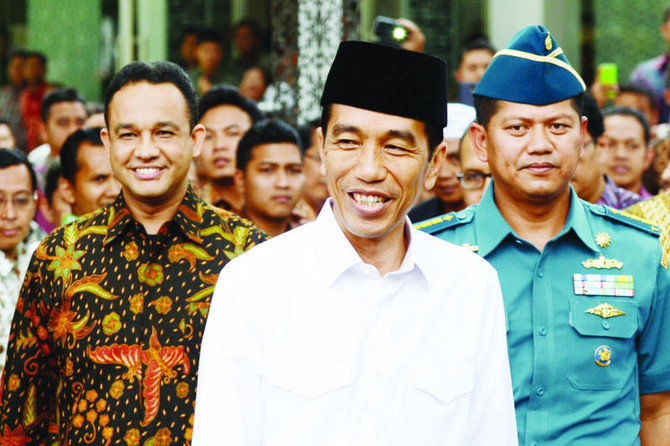JAKARTA: Indonesia’s growth slowed to the weakest pace since the global financial crisis as commodity prices fell, increasing the challenge for President Joko Widodo as he seeks to revitalize Southeast Asia’s biggest economy.
Gross domestic product rose 5.01 percent in the three months ended Sept. 30 from a year earlier, the statistics bureau said in Jakarta. That compared with a median estimate of 5.1 percent in a Bloomberg News survey of 26 economists, and was the smallest gain since 2009 based on previously reported data compiled by Bloomberg.
Widodo took charge of the world’s fourth-most populous nation last month, pledging to bolster growth to 7 percent in two years, a pace Indonesia hasn’t seen since the years before the 1997-98 Asian financial crisis.
The president, known as Jokowi, plans to revive investor confidence by scaling back fuel subsidies to free up funds for infrastructure projects and curb a near-record current-account shortfall.
“We don’t think this will prevent the government from raising fuel prices, but it may prompt the central bank to rethink possibly raising rates in response to higher fuel prices,” said Aldian Taloputra, an economist at PT Mandiri Sekuritas, unit of the nation’s largest bank.
“We should remember that the economic slowdown was engineered to address the current-account deficit.”
Indonesia’s GDP rose 2.96 percent last quarter from the previous three months. That compares with a median estimate for 3.03 percent growth in a Bloomberg survey of nine analysts.
Full-year expansion could be less than 5.1 percent if fuel prices are raised, Bank Indonesia Senior Deputy Gaovernor Mirza Adityaswara said in a mobile-phone text message Wednesday.
“The global economy is still not cheering,” said Suryamin, the head of the statistics bureau who like many Indonesians goes by one name. “Prices of exported commodities are still slowing down,” he said, adding that a drought may depress agricultural growth this quarter.
Palm oil prices touched 1,914 ringgit ($574) per ton in Malaysia on Sept. 2, the lowest since March 2009, after slumping into a bear market in July. Indonesia and Malaysia supply about 86 percent of global output, the US Department of Agriculture estimates.
Indonesia’s household consumption increased 5.44 percent in the third quarter from a year earlier, the statistics bureau said Wednesday. Government consumption rose 4.37 percent, investment climbed 4.02 percent, while exports fell 0.7 percent.
“The poor performance highlights the scale of the challenge facing the country’s new president,” said Gareth Leather, an economist at Capital Economics Ltd. in London.
Indonesia growth slows as bar rises for Widodo economic goal
Indonesia growth slows as bar rises for Widodo economic goal











